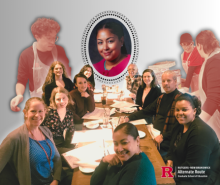NJ Alternate Route Teachers on Meeting the Needs of Special Education Students
Most New Jersey teacher certification programs dedicate a portion of its coursework to teaching students with learning disabilities. With mainstreaming special education students on the rise, learning to navigate one’s teaching responsibilities for these unique learners is a professional imperative. An important first step towards creating an inclusive learning environment for them involves developing an awareness of their characteristics as learners. Teachers in the New Jersey Alternate Route program explore common characteristics of their mainstreamed special education students while also sharing the strategies they use to surmount challenges they experience in managing the inclusive classroom.
My biggest challenge when creating an inclusive environment for students with disabilities is the reaction from other students who think I am favoring the student with the disability. For example if a student with an IEP needs more time to complete an assignment, I allow it. A student without an IEP who hasn’t completed the assignment sees this and wants the extension like the IEP student. In addition to providing extra time for assignments, I create opportunities for students with IEPs to succeed in my class by giving them projects that showcase their talents. If I have a student who is a better artist than speaker, I will allow them to draw instead of creating a speech. ~A. DeLuce
A challenge I face is when a student forgets to take their medicine on a particular day, and they have more behavioral issues as a result and distract other students during a lesson. I try to keep in touch with the special education teacher and the student’s parents in order to communicate any concern I have regarding their child’s behavior in math class. I work hard at building a support team and working with the special education teacher, the child study team, the parents, and communicating so that the student does not get confused between school and home expectations. Communication fosters consistency, and it is important to keep an open line of communication with the student’s parents at least once a week. The most important factor is consistency, kindness, and clarity. ~ C. Bilgutay
Making sure the modified classwork is as actively engaging and as within the students with learning disabilities ranges of capabilities is my biggest challenge. All students should be challenged, not frustrated. As a general education teacher, I create opportunities for students with learning disabilities to succeed in class by ensuring that differentiated work and assignments are modified--not different. The lesson and content is presented to the entire class. Modifications level the playing field for students with learning disabilities; they should not separate them from their peers. ~D. Caruso
My classes last 100 minutes, which is a really long time for students who struggle with attention disorders (like ADHD) and impulsivity. One-hundred minutes does not really accommodate students who cannot sit for long periods of time without breaks or who need material chunked into small pieces to better understand it (as I am expected to cover a lot of material in one class due to the amount of time we have). I attempt to incorporate as much group work and movement as possible because this helps my students with attention difficulties. Additionally, I ask students what has worked for them in the past since my students are old enough to give concrete suggestions and tell me exactly what they need. Parent communication is also key, especially with students who struggle with behavior issues related to their learning disabilities. ~G. Molinaro
When teachers share anecdotes like these, it’s a clear indicator to other teachers that they are not alone in the struggle to effectively manage the inclusion setting. The anecdotes also serve to inspire teachers who need the examples from their peers’ successes. However, new teachers need more than anecdotes and inspiration; they need resources that will connect them with learning disabilities research, current issues in special education teaching and learning, and information that will increase their effectiveness with using inclusive educational practices.
See how these trusted resources can help.
-
The Inclusive Schools Network (ISN) is an online educational repository which connects teachers to resources which foster inclusive educational practices.
-
The Council for Exceptional Children (CEC) maintains a resource hub offering new teachers a wealth tools to use in the classroom along with the latest education policy and research news on special education.
-
Inclusive Education in Action: Empowering Teachers: Empowering Learners is a web-based resource dedicated to empowering teachers to provide the best of special education services.
-
Disability Scoop provides up to date news to keep teachers abreast of various issues in special education.
In addition, these curated resources represent the collective efforts of some New Jersey Alternate Route teachers to find and share information, tools and strategies to advance inclusion in their classrooms.

 Heather Ngoma has over 25 years of experience collaborating with educators across New Jersey to drive education innovation. She currently serves as the Director of the Rutgers-GSE Alternate Route Program in the Department of Learning and Teaching, a program which helps career changers, recent college graduates, and other aspiring education professionals become licensed teachers in New Jersey. Follow her on Twitter @heatherngoma.
Heather Ngoma has over 25 years of experience collaborating with educators across New Jersey to drive education innovation. She currently serves as the Director of the Rutgers-GSE Alternate Route Program in the Department of Learning and Teaching, a program which helps career changers, recent college graduates, and other aspiring education professionals become licensed teachers in New Jersey. Follow her on Twitter @heatherngoma.





